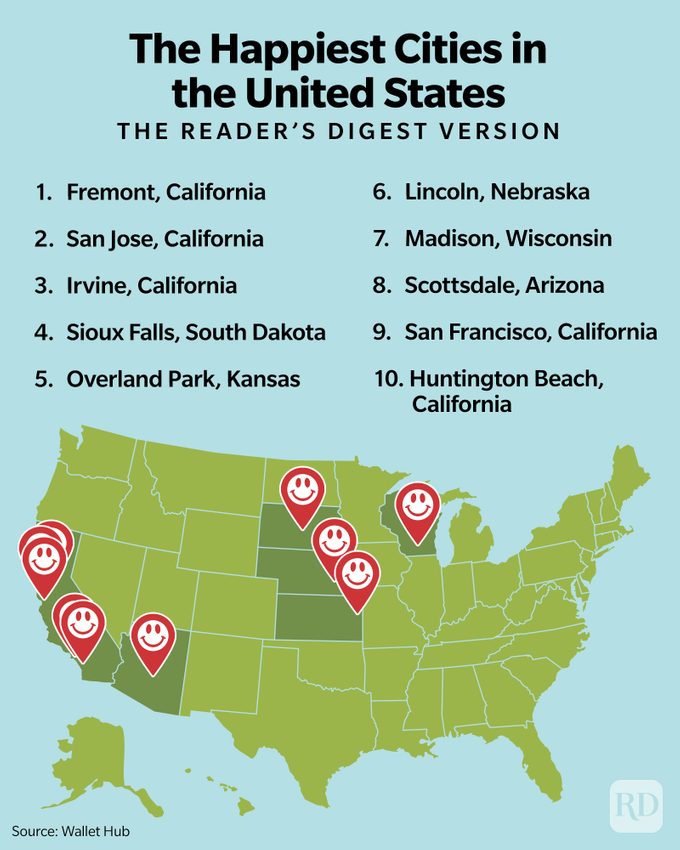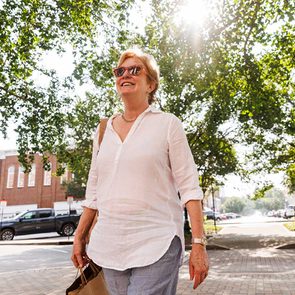If you want to be happier (and who doesn't?) put down roots in these cities

New Study Reveals: These Are the 10 Happiest Cities in America

It can be easy to fall into the trap of thinking we need more to make us happy—more space, more stuff, more money. But material goods don’t always do the trick. Instead, happiness comes from a whole host of things, and the place you call home can play a major role.
“Some research suggests where you live, in and of itself, can directly influence your happiness—for example, people who live in places where they have access to nature and green spaces are, on average, happier,” Matthew Joseph, PhD, an associate professor and counseling program director at the School of Education at Duquesne University in Pittsburgh, said in a statement. He’s one of a handful of experts who teamed up with WalletHub on its 2025 Happiest Cities in America report.
Ready to discover the cities where you’re most likely to find happiness? If you’re looking for your next best place to live—and happiness is a priority—keep reading.
Get Reader’s Digest’s Read Up newsletter for more news, humor, travel, tech and fun facts all week long.
How were the happiest cities in the U.S. determined?
To determine the happiest cities in the United States, WalletHub identified 182 of the largest U.S. cities, including the 150 most populated cities and at least two of the most populated cities in each state. If a huge city isn’t your style, don’t worry; this list is packed with some of the best smaller cities as well.
From there, WalletHub looked at 29 key indicators of happiness across three key dimensions:
- Emotional and physical well-being
- Income and employment
- Community and environment
The study considered everything from depression and suicide rates to commute times and poverty rates. The study put some extra weight on factors like the average leisure time per day and sports-participation rate.
WalletHub graded the metrics on a 100-point scale—with a score of 100 representing peak happiness—and then determined each city’s weighted average. The result: a ranking of the cities in order of their scores out of 100.
Which city is the happiest in America?

Fremont, California, ranked first on the list of the happiest cities in the United States, with a score of 73.54. That’s right: The winner didn’t earn a perfect 100. It’s proof that every town has some shortcomings—but some places are more than good enough.
Considering the climate, which allows for year-round access to the outdoors, it’s not surprising that the happiest city in America is in California. But let’s take a closer look at why Fremont is such a happy place.
Why is Fremont the happiest city in America?
There are a lot of reasons this San Francisco Bay Area city is all smiles, including residents’ emotional and physical well-being, their income levels and the community and environment. Let’s dive deeper.
Income is high
Money can’t buy happiness—to a degree. Studies have found that happiness increases are commensurate with income up to $75,000. Once you make more than that, you won’t experience any further rise in happiness.
What does that have to do with Fremont? Well, 80% of households there have an income over $75,000. A city full of residents making good money is a happier city.
“Money can buy you time and flexibility, which can turn into better options, which can lead to happiness,” Rachel Wu, PhD, an associate professor in the Department of Psychology at the University of California, Riverside, who teamed up with WalletHub for the report. “There is some research showing that up to a certain salary level, money can definitely allow you to be more happy. However, those who spend money on experiences, giving back and better options in general can be happier no matter the income level.”
Well-being is strong
Fremont ranks No. 1 for emotional and physical well-being. Worth 50 points, this is the most heavily weighted of WalletHub’s categories.
Overall, residents here are healthy, both mentally and physically. The city has the fifth-lowest depression rate and a separation and divorce rate of only 8.9%, the lowest in the country. Fremont also ranks fourth highest in the U.S. for average life expectancy. To top it off, this is a kind, caring place. When WalletHub conducted a study on the most caring cities in America, Fremont ranked sixth.
“One of the strongest predictors of happiness is not success or wealth but rather your social relationships,” Julianne Holt-Lunstad, a professor of psychology and neuroscience and the director of the Social Connection and Health Lab at Brigham Young University, said in a statement with WalletHub. “Social connection is consistently rated as the top contributor to overall happiness.”
Which other cities round out the top 10?
California, somewhat predictably, bookends the top 10—and dominates half of the list. But four Midwestern cities secured spots. This suggests that, while good weather might put a smile on people’s faces, it may not be enough to make people truly happy and content. Weather, after all, is fleeting, but factors like community involvement and food security have a more lasting impact on happiness.
After Fremont, the other cities rounding out the top ten are:
- Fremont, California
- San Jose, California
- Irvine, California
- Sioux Falls, South Dakota
- Overland Park, Kansas
- Lincoln, Nebraska
- Madison, Wisconsin
- Scottsdale, Arizona
- San Francisco, California
- Huntington Beach, California
Do you live in a happy place?
If you think you live in a happy place and are wondering why your town didn’t make the list, it’s most likely because the population is too small to meet the study’s criteria. If you’re happy and think you landed a great place to live, congratulations!
If you haven’t yet found your happiest city—or your happiest self!—don’t fret, it’s coming. “Research shows that in general, people seem to get happier and prioritize happiness as they age, such as surrounding themselves only with people who bring them joy,” explains Wu.
Why trust us
At Reader’s Digest, we’re committed to producing high-quality content by writers with expertise and experience in their field in consultation with relevant, qualified experts. We rely on reputable primary sources, including government and professional organizations and academic institutions as well as our writers’ personal experiences where appropriate. We verify all facts and data, back them with credible sourcing and revisit them over time to ensure they remain accurate and up to date. Read more about our team, our contributors and our editorial policies.
Sources:
- WalletHub: “Happiest Cities in America (2025)”
- Julianne Holt-Lunstad, professor of psychology and neuroscience and director of the Social Connection and Health Lab at Brigham Young University in Salt Lake City
- Matthew Joseph, PhD, associate professor and counseling program director at the School of Education at Duquesne University in Pittsburgh
- Rachel Wu, PhD, associate professor in the Department of Psychology at University of California, Riverside























